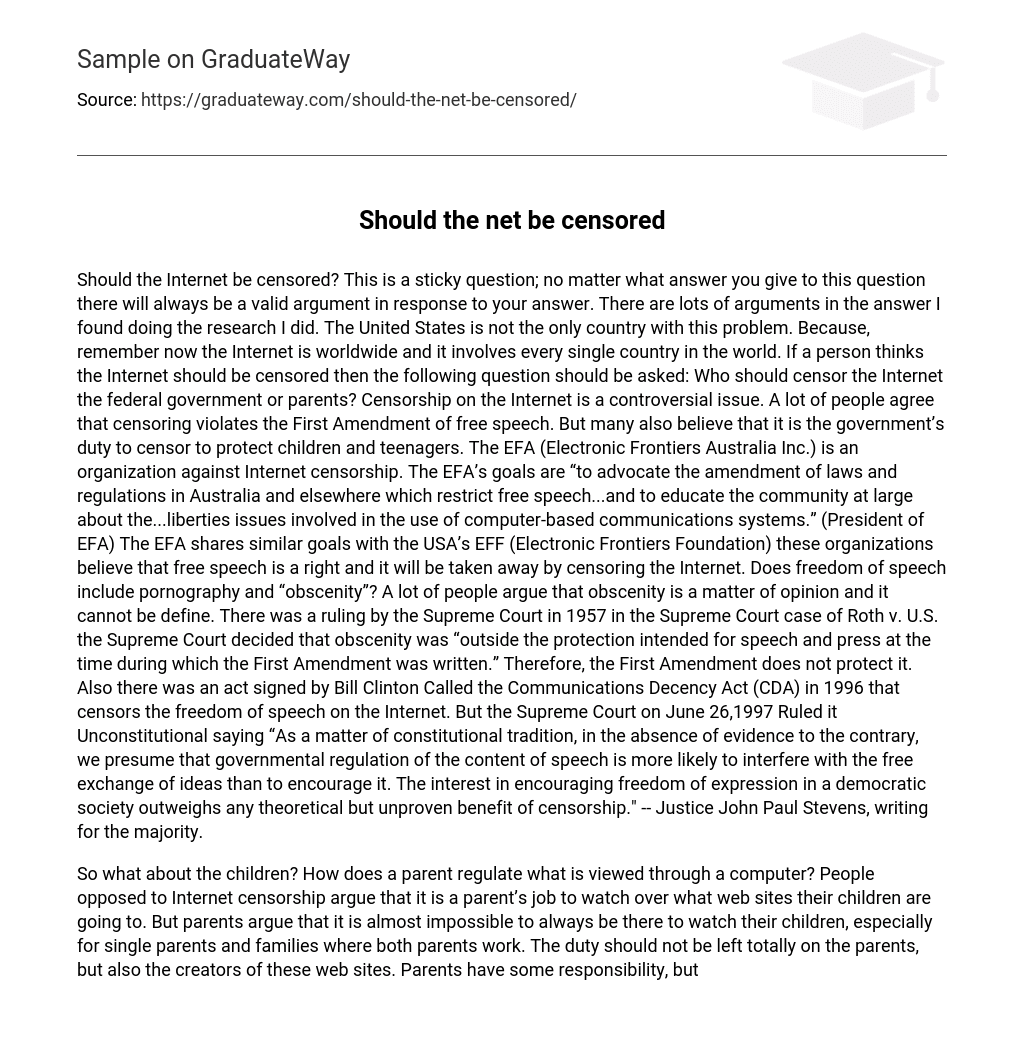The debate over internet censorship is fiercely debated globally, not just in the United States. The question of who should bear responsibility for this censorship, governments or parents, is a crucial aspect to consider. Some argue that censoring the Internet violates the First Amendment’s right to free speech, while others believe it is necessary to protect children and teenagers. Both the Electronic Frontiers Australia Inc. (EFA) and USA’s Electronic Frontier Foundation (EFF) oppose internet censorship and advocate for free speech rights. Another point of contention revolves around whether pornography and “obscenity” fall under freedom of speech, as obscenity is subjective and lacks a definitive definition. In 1957, in Roth v.U.S., the Supreme Court ruled that obscenity does not receive protection under the First Amendment, indicating it is not safeguarded by free speech rights. In 1996, President Bill Clinton signed the Communications Decency Act (CDA), which aimed to restrict freedom of speech on the Internet while including restrictions on pornography and obscenity.On June 26, 1997, the Supreme Court ruled that it was unconstitutional to regulate speech content. The Court emphasized that unless proven otherwise, government regulation of speech content is more likely to hinder rather than support the free exchange of ideas. Justice John Paul Stevens highlighted that in a democratic society, the protection of freedom of expression is more important than any potential benefits gained from censorship.
Parents have concerns about controlling their children’s internet access, but critics argue that it is the parents’ responsibility to oversee their children’s website usage. However, parents respond by saying that constant monitoring is difficult for single parents and families where both parents work. While parents do have some responsibility, they cannot monitor their children around the clock. This is where website creators can step in by implementing measures to prevent underage individuals from accessing their content.
According to PsyberNut on Protecting Children Online, instead of censoring the internet, parents should actively supervise their children’s online activity. Thankfully, programs like Surfwatch, CYBERsitter, and Cyber patrol now exist to block inappropriate content such as pornography and help parents control what their children see on the Internet when they are unsupervised.
Many individuals are not actively seeking explicit websites, but rather, these sites target unsuspecting individuals. For example, pop-ups may appear on certain websites without the user clicking on them. Furthermore, children can access harmful materials beyond explicit content and pornography online. There are websites that provide instructions on creating bombs, car hijacking, weapon usage, and a range of potentially dangerous topics. This can have severe consequences as children lack the ability to responsibly handle such information and may engage in dangerous activities for fun.
To address these risks, many schools rely on filtering programs to censor student research conducted on their computer systems. The Board of Education has implemented a filter that blocks students from accessing websites related to news and sex education categories. Interestingly, this blocking program even restricts access to reputable sources like major news outlets, policy groups, and scientific and medical organizations. As a result, students face significant challenges when conducting thorough internet-based research for academic projects while at school.
Teachers and parents have expressed concerns to the Board of Education about the excessive limitations imposed by the blocking program which affects students’ ability to conduct comprehensive research effectively.Morman Segel, Executive Director of a civil liberties group, criticizes the broad scope of the blocking program, stating that it is overly inclusive. Teachers and parents argue that using a filtering program authorized by the Board of Education would be more effective in deciding which online content to block or permit compared to the current program called I-Gear, which lacks this feature. In my view, instead of government regulation, individuals should have the freedom to control their own internet experience. If parents want to safeguard their children from internet risks, they can utilize a filtering program on their personal computer. The internet can function as a secure and valuable resource for children’s education and research purposes.





